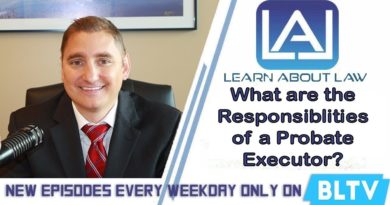You Should Use A Living Trust If…
 If your estate plan has certain objectives, a living trust may be the best option. You value your privacy
If your estate plan has certain objectives, a living trust may be the best option. You value your privacy
You likely conduct your financial affairs in a confidential manner. There are many reasons you don’t want everyone to know your decisions. If you state your final wishes in a simple will, it would be admitted to probate, which is a public proceeding.
Anyone interested can access the records to find out how the assets were distributed. This loss of privacy can be disconcerting and cause uproar among family and friends.
Another option is to use a living trust, which is administered outside of the probate process. If this is a priority, you should certainly consider the utilization of a living trust instead of a will.
You Want to Facilitate Timely Inheritance Distributions
The process of probate will typically take six months at a minimum. The probate process can take much longer in more complex cases. The estate will not be distributed to the heirs until the probate process is complete. The waiting period is not mandatory because the court isn’t involved in a living trust. The trustee has much more latitude than the executor of a will.
You Want To Prepare for Possible Incapacity
When you have a living trust, you will act as the trustee while you are living. You can exercise complete control over the assets at every stage. There are other causes of cognitive impairment. Unfortunately, there are other causes of cognitive impairment.
In addition to this threat, some elders cannot handle their own affairs when they are battling serious medical conditions.
To account for possible incapacity, you can name a disability trustee when you establish a revocable living trust. The individual or professional fiduciary that you name would step into the role if it ever becomes necessary.
You Are Concerned About Reckless Spending
Transfers that are facilitated through the terms of a simple will as a standalone asset transfer vehicle are distributed in lump sums all at once. After the estate is closed, there is no asset protection and no safeguards against reckless spending. If you have a trust, you can include an irresponsible spending clause. The beneficiaries will not be able access the principal directly. Assets in the trust are out of reach of creditors. You can also limit your spending by instructing your trustee to distribute a certain amount each month or dictating some other incremental payment arrangement. You can instruct your trustee to distribute a certain amount each month, or you can dictate some other incremental payment arrangement.
You Would Like to Create a Joint Estate Plan
If you are married, you and your spouse may want to use a revocable living trust if you have a good bit of jointly owned property and you want to leave your respective shares to one another.
You would act as co-trustees, and the surviving spouse would be the sole trustee. One advantage is the fact that they would already have an estate plan in place because the trust would still be active.
Separate individually owned property can be conveyed into the trust as well. In addition, you do not have to name your spouse as the sole beneficiary of your personal property.
The surviving spouse would not be able to change the terms regarding the distribution of their spouse’s separate property.
Schedule a Consultation Today!
We are here to help if you are ready to work with an Oklahoma City estate planning lawyer to put a plan in place. A living trust may be the right choice for you, but there are other options, and we will make recommendations after we gain an understanding of your objectives.
You can schedule a consultation if you call us at 405-843-6100, and you can use our contact form if you would prefer to send us a message.
Our firm also has an office in Tulsa, and if that one is more convenient, it can be reached at 918-615-2700.
After helping his own family deal with a lengthy probate and the IRS following his father’s untimely death in a farm accident, Larry Parman made a decision to help families create effective estate plans designed to reduce taxes, minimize legal interference with the transfer of assets to one’s heirs, and protect his clients’ assets from predators and creditors Read More! Larry Parman is an estate planning attorney who has helped his clients create effective estate plans to reduce taxes, minimize legal interference with the transfer of assets to their heirs, and protect their assets from predators and creditors.






